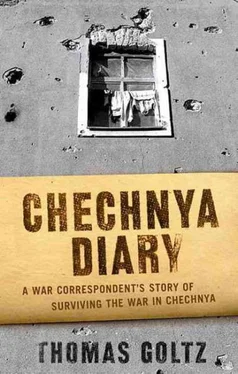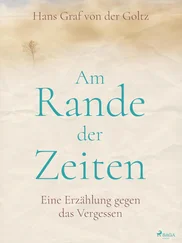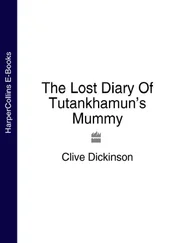My plan was to spend a few days in town, get to know some folks, go out on a few missions, and then get out before the place was obliterated. In the best of all possible worlds, I would accomplish the getting-out part while the obliteration was taking place. In the television trade, this is called collecting “bang-bang.”
But through February and then March 1995, the Russian military had been less than obliging in helping me complete the documentary as planned. True, we had taken a lot of hits around the periphery of the town, but this was mainly long-distance, nocturnal bombing and not very photographic: I got “great” sound—bombs going va-BOOM! and heavy machine gun fire going BrrITT BrrrITT in the outlying woods. But in terms of video image, there was not much to see: long minutes of jet black, all-enveloping night, occasionally interrupted by a drifting orb of distant flares or the sudden flash of a large explosion. Due to the laws of physics, these were seldom if ever in sync with the sound, and thus of no practical use, television-wise.
The daytime attacks by planes and helicopters had also been frustrating. The pilots and gunners had the habit of attacking those parts of town where I was not, or when I approached (as more reasonable people were fleeing or hiding under whatever shelter they could find), remained just out of camera range. Nor can I blame the Russians entirely for my failure. On one occasion, with helicopters literally firing missiles over my head, I was so frightened that I turned the camera off when the choppers were in focus, and back on to shoot my feet churning through the muddy ground while looking for a place to hide. Once the choppers had the audacity to attack while my battery charger was on the fritz, forcing me to wait while the device was repaired and the batteries recharged.
On a professional level this was all very irritating. But on a personal level I was very glad, because, as the days went by and turned into weeks, the townsfolk (and fighters) who had been strangers became acquaintances and then friends and providers and protectors—they became people. And maybe I started becoming a person, rather than just another media mercenary.
My initial hosts were three brothers—Isa, Muhammad, and Musa. None were fighters per se, but men who tried to make their own contribution to the cause in their own way by buying bullets, hand grenades, and even land mines from Russian soldiers. The medium of exchange was often alcohol, and they were not above spiking vodka with bleach. This allegedly increased the thirst for even more vodka, while contributing to blindness.
Through the brothers I met many others in town, civilians and militants. In the former category were men like Vakha, a local cigarette-and-chocolate merchant who also excelled in the procurement of arms from Russian deserters; Ruslan, a high-wire walker in a Moscow circus who acted as a rooftop scout, and Musa, a tailor who had turned his garment-making skills to a rather different use: he stitched together vests from rags to hold Kalashnikov clips; they thus doubled as a bandolier and poor man’s flak-jacket. Their clubhouse, as it were, was the home of the local blacksmith named Alkhazur.
At the time, these men (and boys) were labeled “separatist bandit formations” by Moscow, even though they regarded themselves as “freedom fighters,” or defenders of Chechnya’s independence. Today, almost seven years later, and with the concept of Osama bin Laden embedded into the fearlobe of virtually every Western brain, they would probably be called “Muslim terrorists.” And given subsequent developments in Chechnya—despair, mainly, and a profound sense of merely having been used as pawns in a much larger scenario involving a host of outside actors—it requires no great stretch of the imagination to project at least some of them into Al Qaeda training camps in Afghanistan prior to September 11, 2001, or even participating in the ghastly hostage crisis in Moscow in October 2002, when some 50 kamikaze Chechens, including 18 women, seized a theater packed with more than 750 show-goers. Were any of my friends from Samashki in that theater, dressed in black and espousing suicide in the name of Islam? I do not know and want to doubt it. But human beings driven to despair are ultimately capable of anything, I have learned.
At the time of our acquaintance, the Samashki garrison was staffed with volunteers from all walks of life and motivated by a single impulse: to keep the Russian Army out of their muddy little town. It had to do with potato fields and harvest, and not Islam.
The unofficial leader of the local resistance was a forty-six-year-old farmer named Hussein, a man who embodied the multiple contradictions and historical baggage of being a contemporary Noxchi , as the Chechens call themselves in their own, very non-Russian language, which they call Noxchi Mot. Hussein had been born in the distant, Soviet Central Asian republic of Kazakhstan, some three thousand miles east of his ancestral homeland in the Russian North Caucasus. The reason for this was stunningly simple, and was basic to understanding the Chechen soul. On the night of February 23, 1944, and at the height of the Soviet winter war against Hitler, Josef Stalin charged the entire population of Chechnya with collaboration with the Nazi Wehrmacht , and sent the Chechens into internal exile. The Vysl, or Deportation, was conducted by the most brutal of methods: Families were rounded up, packed on boxcars and sent east in the general direction of Central Asia and the Chinese frontier. Half died en route, and all who survived carried the soul scars that came from the near-genocide. One of Hussein’s three children, a boy named Ali, had the misfortune to have been born on “The Day” and had thus never been allowed to celebrate his birthday.
Hussein was back in Kazakhstan when word came that war had broken out in his homeland. He immediately sold all the farm machinery he had, with the exception of a truck, purchased weapons on the black market and began making his way back to Samashki. With him came his younger brother Ussam (whose wife and two young children were already there), his cousin Shirvani (a bookworm who had undergone two treatments for bone cancer acquired during his Soviet-era military service, when he and two other Chechens were obliged to load nuclear warheads—the other two men were dead); Shirvani’s brother-in-law Xamid (a mean and wiry shepherd you wanted on your side and not against you); a pleasant young man of about twenty-five named Seylah, who seemed to be related to Xamid in some way, and Ali, a big jolly fellow who was always laughing and joking (and who, of course, was the first casualty). Bringing up the rear was Hussein’s nephew Sultan, a doe-eyed youth who was fulfilling his father’s defense duty because the latter was bedridden after having undergone a liver operation.
With me tagging along, this small group planted antitank mines in the potato fields surrounding Samashki, patrolled the roads, and blew up railway bridges to prevent the Russians from sending an armored train piled high with ammunition down the tracks to reach Grozny. Driving off the armored columns that harassed the town was another activity that required more than a little nerve: In addition to Kalashnikov rifles, Hussein’s arsenal consisted of a single heavy machine gun, which he had his men lug out to various positions in a hay wagon. Because ammunition was so scarce, he would load each shell individually, and never used automatic fire. Still, by moving the gun around, he gave the impression that he had more men and equipment than he did, and once even forced a firefight between two Russian columns, each of which thought that the other was the enemy, as we hid in thorn-bush thickets between the potato fields.
Читать дальше











